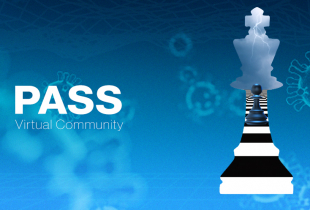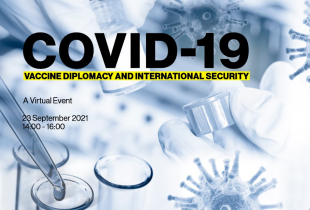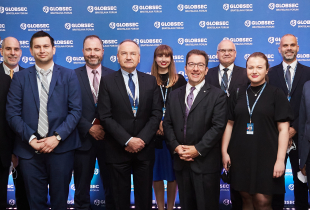
Venezuela: A Dying Country
Introduction
While the world rightfully remains focused on the novel coronavirus disease (COVID-19) pandemic, the already failing state of Venezuela approaches an even more harrowing time, which has been largely unnoticed by the global community. Already labeled a failed country by many, it seems unlikely that the current Venezuelan leadership can survive the COVID-19 crisis and emerge unscathed, although they will continue to attempt to consolidate power. As the military is assigned even more control over daily activities, the future of Venezuela remains murky. However, until a change in government, voluntarily or forced, Venezuela and its beleaguered population seem destined for more misery.
Why does all this matter and why should the rest of the world care about what happens on the north coast of South America? First and foremost is the human tragedy that is unfolding in Venezuela, which will undoubtedly be magnified by COVID-19. A second major concern is the instability and insecurity that Venezuela is fomenting throughout the region. Finally, the failure of Venezuela will eventually have a global impact, as the country possesses the largest proven oil reserves in the world and is also a significant state sponsor of trafficking in illicit goods ranging from endangered wildlife to illegal gold and, most significantly, drugs.
Origins of the Crisis
So how did the once-wealthiest country in South America arrive at this unfortunate state? Even a cursory look at the decline of Venezuela cannot help but place the blame on corrupt, incompetent, self-serving political leadership. Hugo Rafael Chávez Frías,1 president of Venezuela from 1999 until his death in 2013, had already started his country down the road to disaster before his demise. His once-heralded Bolivarian Revolution led to hyperinflation, rampant poverty, and human rights violations, as well as critical shortages of food and medicine.
The fact that Nicolás Maduro, vice president under Chavez, deployed police and the military across the country “to guarantee the peace” immediately following Chavez’s death on March 5, 2013, was a harbinger of what was to come. While some in the country mourned, expatriate Venezuelans—particularly the large southeastern U.S. community— rejoiced and called for a change to Chavez’s failed policies.
Maduro, a former bus driver and trade union leader whose only political qualifications seem to be a devout adoration of Chavez, has driven Venezuela even further into misery and failure after assuming office following a special presidential election in 2013. He has remained in power even after an opposition-led National Assembly was elected in 2015 and has ruled by decree since.
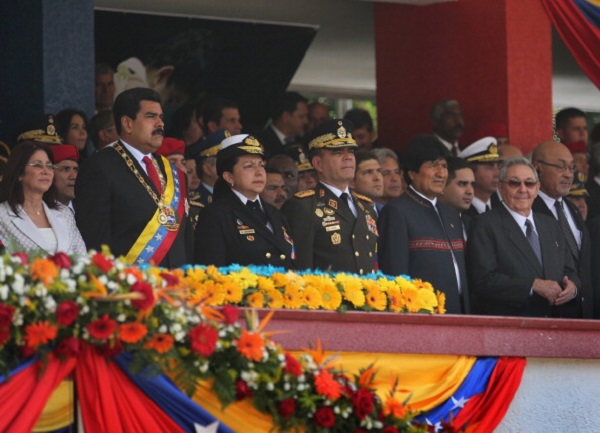
In May of 2018, a highly-criticized special presidential election was called after having been rescheduled twice. The constituent assembly, a body with no qualifications, authorized the election, however the main opposition parties and their respective candidates were banned from taking part. The result was a second six-year term for Maduro. Extremely low voter turnout and other irregularities led to sanctions by several governments, including the United States and the Organization of American States (OAS).
Humanitarian Catastrophe
Today, Venezuela represents one of the largest displaced populations in the world, second only to Syria, with no relief in sight. Conservative estimates put the total of displaced refugees at over 4.1 million, with Venezuelan refugees seeking safety primarily in Colombia (~1.8 million), Peru (~860,000), Ecuador (~366,000), and the U.S. (~290,000). Smaller neighboring countries like Trinidad and Tobago (~40,000), Guyana (36,000), and Curacao (~26,000) are especially susceptible to being overwhelmed by the influx of refugees. Even Europe is not immune, with over 200,000 refuges in Spain, 50,000 in Italy and another 25,000 in Portugal.2 The OAS predicts that the number of Venezuelan refugees will surpass the number of people who fled Syria in 2020.3
Venezuela’s woes are already impacting other countries in the region. Colombia is being seriously challenged, as it shares a large, mostly unsecured border with Venezuela. While Colombian President Iván Duque Márquez attempts to implement the controversial peace process with the Fuerzas Armadas Revolucionarias de Colombia (FARC) that was initiated by his predecessor, Juan Manuel Santos Calderón, key resources are necessarily being diverted to deal with the massive influx of refugees.
Venezuela provides sanctuary to former members of the FARC that did not demobilize, as well as the Ejército de Liberación Nacional (ELN). These organizations continue to conduct violent cross-border operations and traffic illicit goods while attempting to undermine the legitimate government of Colombia. There are also reports of the Maduro government intentionally inserting released criminals into refugee caravans to cause further chaos. So while Maduro clings somewhat precariously to power in his own country, he seeks to spread discontent among Venezuela’s neighbors.
Now, for a country that is already catastrophically failing, adding COVID-19 into the equation makes the prognosis even more alarming. Neighboring countries have closed their borders in an attempt to stem the outpouring of refugees, but porous and remote frontiers make this an almost impossible task.
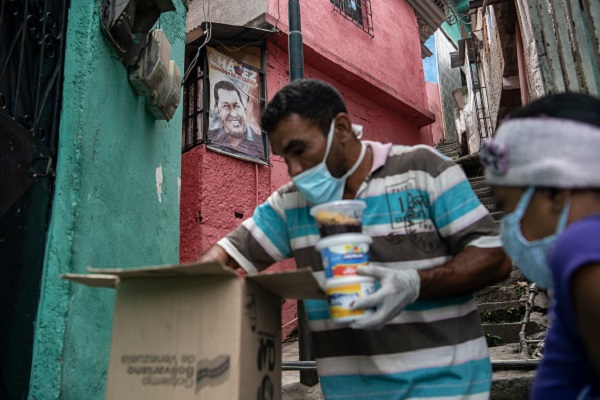
Several key countries, including Colombia, already have significant refugee populations that lack any form of documentation, therefore falling outside any formal governmental support. Colombian news outlets recently noted a “Bomba de Tiempo” (time bomb) in parts of Bogotá as Colombians begin to react negatively towards Venezuelan refugees. Chile now demands passports and visas for refugees, something that most refugees understandably lack. Ecuador, normally a transit country for refugees, is now also requiring visas. Even Peru, formally hospitable towards refugees, has begun to show strain and a degree of intolerance. The potential likelihood of Venezuelan refugees spreading COVID-19 is real, as many are already in poor health and suffering from various degrees of malnutrition. Ironically, some Venezuelans seek to return home across closed borders as they lack the means to sustain themselves in increasingly hostile countries. All this also means a significant decrease in remittances, an important source of foreign capital flow for Venezuela.
Ms. Carrie Fillipeeti, the Assistant Secretary of State Western Hemisphere Affairs, recently noted that 44 percent of Venezuelan hospitals lack electricity; 66 percent do not have running water; 64 percent lack access to X-ray capability; and 94 percent have no respiratory care.4 Add to this the fact that there are only eighty-four intensive care unit beds within the country and the magnitude becomes alarming. An estimated 75 percent of qualified medical personnel have fled Venezuela, leaving an aging, more susceptible medical corps to deal with the pandemic.5 The complete unpreparedness of Venezuela, coupled with the pandemic of COVID-19, will continue to encourage exodus with all its attendant challenges.
Uncontrolled migration is not the only menace emanating from Venezuela. Late last month on March 26, 2020, the U.S. Department of Justice charged Maduro and fourteen current and former Venezuelan officials with narco-terrorism, corruption, drug trafficking, and other criminal charges. U.S. Attorney General William P. Barr stated, “For more than 20 years, Maduro and a number of high-ranking colleagues allegedly conspired with the FARC, causing tons of cocaine to enter and devastate American communities.”6
Also of note was the charging of Luciano Marín Arango (aka Iván Márquez) and Seuxis Paucis Hernández Solarte (aka Jesus Santrich), both high-ranking members of the FARC. Maduro’s response was to accuse the U.S. and Colombia of “giving orders to flood Venezuela with violence” and to announce an investigation on opposition leader Juan Gerardo Guaidó Márquez.
Maduro’s unsavory rule has not gone unchallenged at home, either. Since January 2019, as the President of the National Assembly of Venezuela, Guaidó has challenged Maduro’s legitimacy. Over sixty countries, including the U.S. and Germany, recognize Guaidó as the legitimate president of Venezuela. Not surprisingly, other struggling leftist countries in South and Central America, among them Bolivia, Nicaragua and Cuba, as well as Russia, continue to support the Maduro regime.
To help forestall the current crisis, opposition leader Guaidó recently called for the creation of a “national emergency government” that would include opposition members. Unfortunately, in spite of significant international recognition, Guaidó’s influence has waned since he declared himself acting President on January 23, 2019. After reaching a potential high point in the spring of 2019 when he launched Operation Libertad (Operation Freedom) and appeared to be on the cusp of unseating Maduro, Guaidó has largely faded into the background.
Whither Venezuela?
What happened to Guaidó’s once seemingly sure thing and where does this leave Venezuela? First and foremost, Maduro has successfully retained the loyalty of his highest-ranking military commanders and the unscrupulous Venezuelan National Guard. Continuing a tradition started by Chavez, Maduro has effectively bought the loyalty of his senior commanders and—through threat of punishment and imprisonment—their troops. Although there have been some notable defections, Hugo Carvajal former head of Venezuelan Intelligence among them, high-ranking defections remain the exception.
The military exercises control over much of the country’s natural resources, including the state-run petroleum company, Petróleos de Venezuela SA (PDVSA), which has experienced a continual decline in production and export revenue generation. Venezuela’s once-productive petroleum industry continues to suffer from extreme mismanagement, corruption, and general malaise.
Crude oil production stands at its lowest level in over half a century and Venezuela lacks the technology to fully capitalize on its unique heavy crude reserves located in the Orinoco Belt. The recent fall of global oil prices to a little more than $20 per barrel will only exacerbate a shortage of international revenue. Discovery of potentially even greater oil reserves in Guyana’s exclusive economic zone (EEZ) make the near-term recovery of Venezuela’s petroleum industry even more unlikely and less relevant.
Another way that Maduro can afford to buy his senior military leaders is through complicity in the international drug trade. Some estimates indicate that about a quarter of all cocaine produced domestically in Colombia transits through Venezuela on its way to the U.S.7 Although this constitutes only a small portion of the overall flow, virtually all non-commercial aircraft carrying cocaine to Central America for eventual movement on to the U.S. depart from Venezuela’s Apure Valley, demonstrating governmental acquiescence if not outright support.
Perhaps the most direct indictment is the existence of the Cartel de los Soles (Cartel of the Suns), which is named after the sun insignia worn by Venezuelan general officers actively involved in international drug trade. Although international sanctions have had an impact, as long as the cocaine trade continues, Maduro will have at least one means to buy the loyalty he needs to remain in power while the general population suffers.
It remains to be seen what impact COVID-19 will have on drug trafficking. While traffickers are not encumbered by business morality, drugs sales do require the exchange of money. If the global economy continues to fail, traffickers may have to find other means of compensation for their products, which seems unlikely. Lack of currency exchange could even lead to increased violence as addicts will pursue their “fix” by any means necessary.
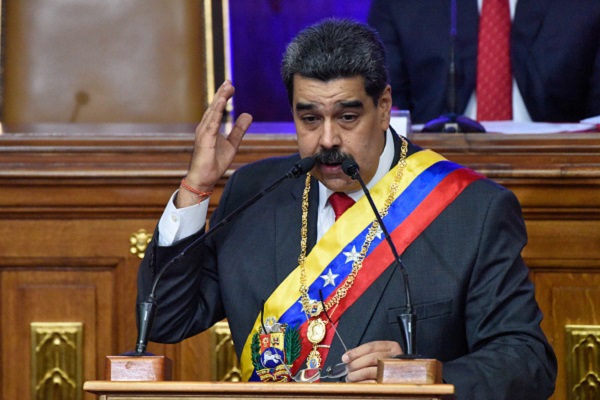
While Maduro and his cronies remain fairly comfortable, acute food shortages plague average Venezuelans. The U.S. and other countries sent significant food donations to the Colombian border town of Cúcuta for distribution in Venezuela last year to coincide with Guaidó’s attempts to intervene. Maduro used the military to block most of the aid, calling it illegal attempts to promote regime change.
As a result of hyper-inflation, a carton of eggs now cost upwards of 250,000 bolivars. In January 2020, Maduro increased the minimum wage to 250,000 bolivars per month with a food subsidy of another 200,000 bolivars per month, or about $6.50 U.S. That means a carton of eggs costs more than 55 percent of the minimum monthly salary, assuming one can find eggs. Infant mortality and malnutrition continue to rise throughout the country. Although Maduro has promised to cut inflation to single digits, Bloomberg’s index reported last month that prices are rising at an estimated 9,900 percent with no relief in sight.8
Conclusion
So where does this leave the once wealthiest country in South America? Venezuela today has a failed economy, a totally unprepared healthcare system, and a corrupt, despotic leader controlling an oppressive and sycophantic military engaged in all forms of illicit trafficking to garner illegal funds and is now facing a deadly pandemic. Yet Maduro tenaciously clings to power, perhaps even benefitting from COVID-19.
In a surprising move, on March 31, 2020, the U.S. called on Guaidó to renounce his presidential claim and work with Maduro, at least temporarily. The likelihood of Maduro accepting this is slim, as he still sees Guaidó as his most dangerous competitor for power and he will continue to seek support from Russia and China. While Russia continues to deliver on aid, especially military aid, China seems to be distancing itself, not from Venezuela but from Maduro and his ham-fisted leadership. Without oil revenues to pay back massive loans, China may not be adverse to a leadership change in Venezuela.
There are still many unknowns ahead for Venezuela and Maduro. Recent U.S. policy shifts leave formerly steadfast support of Guaidó in question. Will the U.S. succumb to international pressure to relax sanctions against Venezuela for humanitarian reasons? Can Maduro use COVID-19 to increase his hold on power? Answers to these questions are largely speculative, but what seems clear is that Maduro will not voluntarily share, much less relinquish, power. That window of opportunity has likely passed.
What does need to happen is that the U.S. and its allies in the region need to establish and enforce policies against Maduro. Vacillating and unclear policy, like shifting U.S. support for Maduro’s ouster, only embolden his rule. The challenges being brought by COVID-19 might just be the catalyst that force Maduro out of power. For a population that has endured so much, the next great challenge may actually have a silver lining.
For Academic Citation
Robert Knotts, “Venezuela: A Dying Country,” Marshall Center Security Insight, no. 55 (April 2020): https://www.marshallcenter.org/en/publications/security-insights/
venezuela-dying-country-0.
Notes
1 Throughout this paper the Spanish naming convention is used for initial citation. The paternal, commonly-used name is listed first and the maternal family name second.
2 IOM UN Migration, “Venezuelan Refugee and Migrant Crisis,” March 2020, https://www.iom.int/venezuela-refugee-and-migrant-crisis and Rocio Labrador, “The Venezuelan Exodus,” Council on Foreign Relations In Brief, July 8, 2019, https://www.cfr.org/in-brief/venezuelan-exodus.
3 Ezra Fieser and Nancy Moran, “Venezuela Exodus Is as Big as Syria's, Yet Got 1.5% of the Aid,” Bloomberg, September 20, 2019, https://www.bloomberg.com/news/articles/2019-09-20/venezuela-exodus-as-big-as-syria-s-got-1-5-of-the-aid-chart.
4 Carrie Filipeti, U.S. Department of State, “Impact of COVID-19 on Venezuelan Migration and the Regional Response,” U.S. Southern Command Analytic Outreach, March 26, 2020.
5 Ibid.
6 U.S. Department of Justice, “Nicolás Maduro Moros and 14 Current and Former Venezuelan Officials Charged with Narco-Terrorism, Corruption, Drug Trafficking and Other Criminal Charges: Maduro and Other High Ranking Venezuelan Officials Allegedly Partnered With the FARC to Use Cocaine as a Weapon to ‘Flood’ the United States,” March 26, 2020, https://www.justice.gov/opa/pr/nicol-s-maduro-moros-and-14-current-and-former-venezuelan-officials-charged-narco-terrorism.
7 Harriet Alexander, “The dirty money and drugs keeping Venezuela's Nicolas Maduro in power,” The Telegraph, August 15, 2019, https://www.telegraph.co.uk/news/2019/08/15/venezuela-has-turned-continents-worst-narco-state-prop-regime/.
8 Max de Haldevang, “Venezuela just hiked its minimum wage 67% but a month of work still can’t buy 1 kg of beef,” Quartz, January 11, 2020, https://qz.com/1783680/maduro-hikes-venezuelas-monthly-minimum-wage-by-67-percent-less-than-1-kg-of-beef/.
About the Author
Robert Knotts is a Professor of National Security Studies at the Marshall Center. Knotts was a career officer in the U.S. Army, retiring after more than twenty-four years on active duty. Previously, he was an Assistant Professor in the Department of History Sciences at the U.S. Military Academy, where he taught History of the Military Art. In this capacity, he received the inaugural “Excellence in Teaching Award” from the Department. He has also served as Professor of Military History at Florida International University. Knotts specializes in countering illicit trafficking and organized crime, with an emphasis on whole-of-government and interagency efforts.
The Marshall Center Security Insights
The George C. Marshall European Center for Security Studies in Garmisch-Partenkirchen, Germany, a German-American partnership, is committed to creating and enhancing worldwide networks to address global and regional security challenges. The Marshall Center offers fifteen resident programs designed to promote peaceful, whole of government approaches to address today’s most pressing security challenges. Since its creation in 1992, the Marshall Center’s alumni network has grown to include over 14,000 professionals from 156 countries. More information on the Marshall Center can be found online at www.marshallcenter.org.
The articles in the Security Insights series reflect the views of the authors and are not necessarily the official policy of the United States, Germany, or any other governments.
